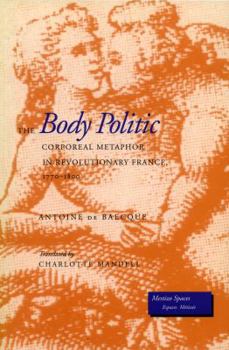The Body Politic: Corporeal Metaphor in Revolutionary France, 1770-1800
Select Format
Select Condition 
Book Overview
This is a remarkable history of the French Revolution told through the study of images of the body as they appeared in the popular literature of the time, showing how these images were at the very... This description may be from another edition of this product.
Format:Paperback
Language:English
ISBN:0804728178
ISBN13:9780804728171
Release Date:October 1997
Publisher:Stanford University Press
Length:384 Pages
Weight:1.20 lbs.
Dimensions:0.8" x 6.0" x 9.0"
Customer Reviews
1 rating
Good in its own way
Published by Thriftbooks.com User , 23 years ago
An explanation of my reasons for reading this book will help. I'm taking a 400 level history course on the French Revolution and this book is on the list of optional texts. I chose to read it because I thought an exploration of corporeal metaphor would be quite interesting.The book, for the most part, was worth the read. It is divided into, I think, 3 parts and 9 sections. In some ways the nine sections are like independent essays related only by the similarity of the very general topic of bodily imagery. There is some structure within the parts, and throughout the work as a whole, though it is loose. Of the 9, the first and last were most interesting to me - the first is about the royal sex as a ceremony, the consumation of Louis' marriage with MA, etc. The last section is about the use of dead or wounded people as martyrs to the revolutionary cause. The other sections (which include one on Abbe Sieyes, one on David's paintings, etc.) are interesting, but somehow seem related less directly to issues which seem important to me; the first discusses perceptions of the king (physical impotence as it was associated with political impotence, etc.) and the last the abuse of rhetoric(maybe that's a bad label). The rest of the sections seem to address more peripheral issues.The writing (or perhaps I should say the translation) is clear and readable enough. It is almost, though, more philosophical than historical. De Baecque remains firmly (for the most part) on the level of abstractions - many of the distinctions he draws, categories he imposes, connections he makes, are very theoretical, even to a fault. But despite that, the book is, on the whole, well done. It will appeal only to students of the Revolution - it is a kind of specialty item. A fairly deep knowledge of the revolution is needed to approach it.





